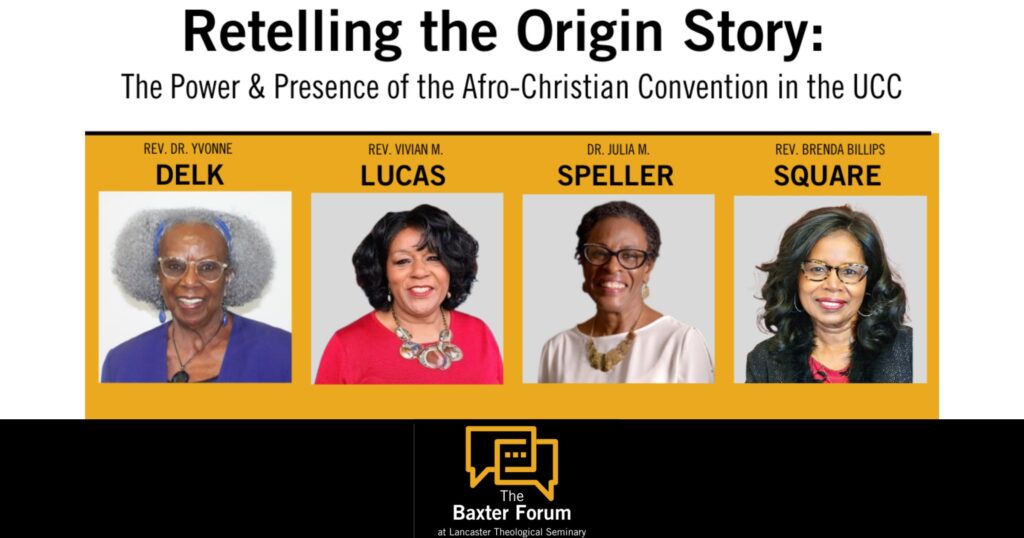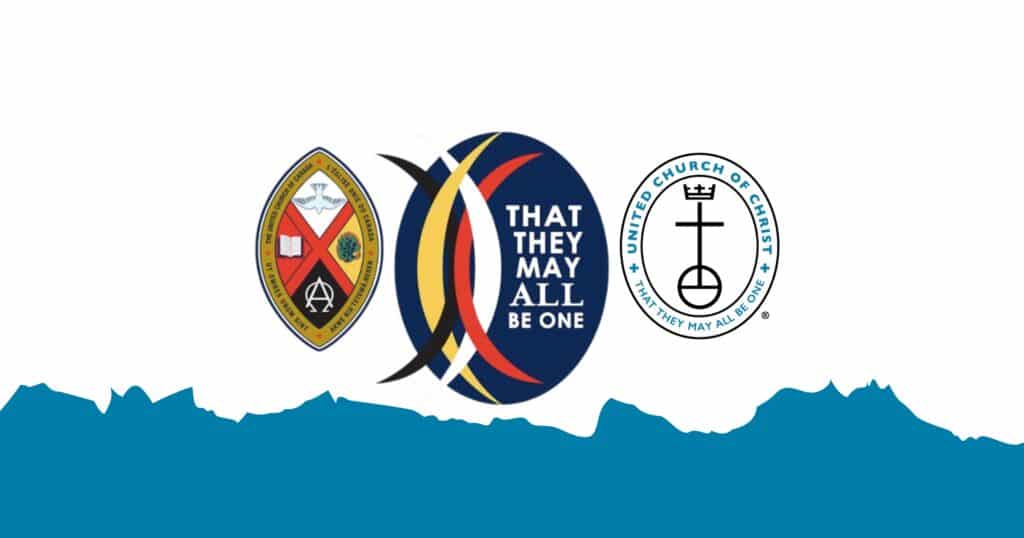‘Retelling the Origin Story’: Leading voices share Afro-Christian presence in UCC
The Afro-Christian tradition has a long, rich history that many do not know. It’s a history that Professor Emerita Julia M. Speller of Chicago Theological Seminary said “remains alive and well in the presence and power of Black church involvement in the United Church of Christ today.”
Officially acknowledged by the UCC Historical Council in Sept. 2022 as the ‘fifth stream’ that formed the UCC denomination, the Afro-Christian tradition was originally formed in 1892 from independent conferences of Black churches that developed in North Carolina and Virginia.
Speller, a member of the Historical Council, led a recent conversation with some of the leading voices who are making this presence and power within the UCC known.
The online conversation, which took place on Feb.16, created space for sharing the depth of this tradition within the UCC. It was sponsored by the Baxter Forum of Lancaster Theological Seminary.
Afro-Christian archives
The Rev. Brenda Billips Square has spent three years identifying and documenting the churches who comprised the Afro-Christian convention. “Afro-Christians were intentional about leaving a record,” she said. “They took seriously the words of the Psalmist where it says ‘One generation shall commend their works to another.’”
Square, who pastors Beecher Memorial Congregational UCC, also serves as the director of the Afro-Christian Legacy and Preservation Project at the Franklinton Center at Bricks historical site in Whitakers, N.C.
“We have traced the Afro-Christians, been on a journey following them” through first-person testimonies, Sunday school reports, documentation on revivals and women’s mission reports, she said. Some documents depict a determination for this convention to be a distinct entity operating separately from the white churches. They also offer information on data like the number of members, baptisms and churches established, and stories of the “spirit-filled” tradition with a distinct worship style related to traditional African American worship.
“These testimonies bring inspiration and hope, a legacy we are still nurtured by today,” she said. There are currently 66 UCC churches, mostly in the Southern Conference, that trace their taproot to this Afro-Christian legacy.
‘African taproot’
The long history of the Afro-Christian tradition “is flowing from the taproot of African spirituality,” said the Rev. Yvonne Delk, the first Black woman to be ordained in the UCC and a longtime educator, organizer and prophetic preacher. She said that the Afro-Christian story is also her story as “the convention that I’ve been part of all my life.”
The taproot is “rooted in a worldview that all of life is sacred. It begins with the spirit of God as flowing in and through all of life.” She said that it is a “story of survival and liberation” of how Black people appropriated spirituality to their African tradition following the “unspeakable horror” of being stolen from their homelands through the trans-Atlantic slave trade. The spirituality embraces that one “receives life of those who came before you and passes it on to those who come after you,” providing a “blueprint of a Beloved community.”
This stream of tradition must enter into the urgency of the current moment where there is “a cry now for a spiritually transforming moment of justice,” Delk said, particularly in response to “rising assaults against people of African descent and other peoples of color and even an attempt to deny that their history existed.”
A history of ‘holy ground’
The Rev. Vivian M. Lucas described the importance of the Franklinton Center at Bricks, where she formerly served as executive director. At its start in 1871, Black people in the U.S. turned this site that was once a plantation into a school, when they were trying to reclaim some sense of normalcy as a people, she said. The current center preserves and continues this history and legacy.
“For Black Christians who came out of slavery, everything was about justice. Everything was about civil rights and education,” Lucas said. Education was key to this struggle for justice, and “it was through Franklinton Center that churches learned how to minister to the many comprehensive needs of the people.”
Those who started the school at Franklinton Center had a vision that was central to the justice and freedom in the Afro-Christian tradition, bringing together the spiritual to meet academic, emotional and logistical needs. “We know they had a calling,” she said. “The calling was from the deep and it reached until now because we’re still trying to answer that call to liberation and justice.”
“We still say Franklinton Center at Bricks is holy ground,” Delk said, because of the way it transformed land that had been used for the evil of slavery into a space “for hope and possibility of new life.”
‘God’s spirit in everything’
When asked about the enduring legacy of the Afro-Christian stream and how it enhances the UCC today, Delk offered an invitation toward relationality that builds change in the world. She emphasized that historically the UCC has too often viewed people of color as “objects of its mission rather than subjects,” but now the question is, “How can we begin to empower one another through the convergence in these streams for transforming liberation in the world?”
“As the Afro-Christian stream now flows into visibility, it’s freeing the mind, body, soul, for freedom and justice. It’s there for the renewal of systems and to embody God’s spirit in everything,” she said. “It’s the time we have to ask ourselves, how are we going to be the UCC in the midst of brokenness, when the beloved community is a vision still struggling to come into existence?”
This online gathering, which can be viewed here (use passcode *=ZNq!1q) was part of the Lancaster Theological Seminary Baxter Forum for African American Studies. The Rev. Nathan D. Baxter, for whom the forum is named, said that “hearing this story can be a way to make more whole the history of Christian witness … Lest we forget, the struggle continues.”
A book on this history, Afro-Christian Convention: The Fifth Stream of the United Church of Christ, will be published in July by the Pilgrim Press. It is edited by Delk, with Square, Lucas and Speller as contributors.
Related News
Who’s Next?
This week the Supreme Court agreed to oral arguments on the challenges to Presidential...
Read MoreGender and Sexuality Justice Ministries joins global movement to end violence against women, children
The Gender and Sexuality Justice Ministries (GSJM) of the United Church of Christ has joined...
Read MoreUCC and United Church of Canada celebrate a decade of ‘shared mission, mutual accountability, common hope in Christ’
Ten years ago, the United Church of Christ (UCC) and The United Church of Canada (UCCan)...
Read More


